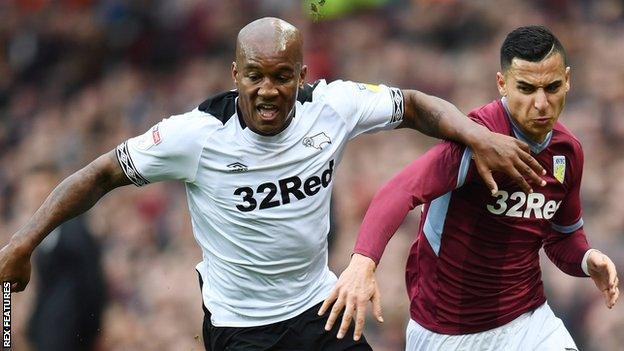Derby County v Aston Villa: Championship play-off a £170m 'roll of the dice'
- Published

Aston Villa and Derby meet in the Championship play-off final on Monday, with Villa having won both league meetings between the clubs this season
It is the richest game in football, but the Championship play-off final between Derby and Aston Villa will leave the loser facing financial strain, according to sports finance expert Dr Rob Wilson.
Football business analysts Deloitte say the winner of Monday's Wembley showdown could earn more than £300m over five seasons if they stay in the Premier League for just one term. A solitary season will see an increase in revenue of £170m.
However, the loser faces another season in the Championship, and both Derby and Villa have tested the profitability and sustainability regulations in recent years.
Villa have admitted that complying with spending rules "will continue to provide a significant challenge" - although they believe they will meet them - while the Rams sold their stadium to their owner to record a profit last season.
"This is last roll of the dice sort of stuff. It's winner takes all and loser loses pretty much everything," said Dr Wilson, of Sheffield Hallam University.
"Sitting at a poker table is a good analogy. This is a case of two teams that have continued to bluff their way out of trouble and who have found themselves on that last hand having both gone all in - this includes the shirt off their back in many ways.
"Where does it go after that?
"They are both really gambling with what could conceivably be the next five years of their playing future.
"Whoever loses won't then be able to spend money next season when they are in the Championship - a league that we know is quite competitive and will be full of clubs with parachute payments, including three with particularly decent squads coming down from the Premier League.
"You wrap all that together with financial distress, falling foul of profitability and sustainability rules and being unable to spend their way our of any trouble against teams that are able to spend, then I'm not painting a particularly sunny picture."
What situation are they in?
Aston Villa's defeat by Fulham in last season's Championship play-off final exposed financial problems at the club.
Days after missing out on promotion they failed to make a £4m tax payment before an agreement with HM Revenue and Customs was reached, but a summer of turmoil off the field followed.
Eventually Egyptian businessman Nassef Sawiris and American financier Wes Edens - co-owner of the Milwaukee Bucks NBA franchise - took a controlling interest in the Midlands side in July.
Still, they are testing the boundaries of the English Football League's spending rules, which allow £39m of losses over three years in the Championship.
This campaign is their third in the division since relegation from the Premier League in 2016. Last season they reported pre-tax losses of £36.1m, following on from a loss of £14.6m in 2016-17.
Derby County, meanwhile, recorded a profit for the first time in 10 years.
However, they made £14.6m only after selling their Pride Park stadium to owner Mel Morris for £80m - raising questions about the club's finances.
Derby's parent company, Sevco 5112, has reported cumulative losses of just under £58.5m in the three seasons up to 2017-18.
"Derby's situation, from a profitability and sustainability point of view, because they sold the stadium to themselves they are okay, but they have no more room to manoeuvre," said Wilson.
"Villa will have to cut cloth accordingly."
Bigger than the Champions League
Victory on Monday will see the winner increase revenue by at least £170m - more than £95m coming from broadcast money for one season the Premier League. Parachute payments over two years will also bring in more than £75m.
That figure rises to a minimum of £300m if they avoid immediate relegation back to the Championship, according to Deloitte.
In contrast, the all-English Champions League final between Tottenham and Liverpool in Madrid on 1 June is estimated to earn the winner just £6.6m as both clubs are already guaranteed a place in Europe's top club competition again next season.
"Any club that enjoys a sustained period of participation in the Premier League could be expected to challenge for a place in the top 30 of the Deloitte Football Money League of the highest earning clubs in world football," Deloitte senior manager Sam Boor said.
"However, significant investment in playing talent in an attempt to retain Premier League status is risky and does not guarantee safety. Recent seasons have seen some promoted clubs survive after restrained spending, while others have gone down despite big spending."